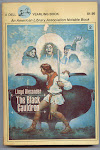Scarcely a hundred years after Chaucer wrote, in a vernacular that we can't read without a glossary, William Caxton wrote, translated and printed works in the English of his day, a form that is much plainer. Once I got into The Game...of Chess, the language presented very few problems. Caxton spelled phonetically, and retained many French words and terms, and the book gives a good picture of the colloquial English of the fifteenth century. They still said "ben" for various forms of the verb "to be." He used the letter u for the small letter v, so that the word poverty was often printed as pouerte.
Another interesting usage was the possessive pronouns his and her. Apparently, "its," meaning "belonging to or done by it," was not used at that time. Also "her" was often used instead of "their." By Caxton's time, the old black letter sign for "th" was represented by the letter "y," so that "ye" or "y'e" was pronounced "the," "th'" or the personal pronoun "thee." When we call it "yee," we're probably wrong except when using it as the plural of "you."
Caxton traveled on the Continent, to Belgium and Germany. In Cologne, Germany, he learned all about the Gutenberg press, and eventually set up a printing press in England. The first book he printed in England was an edition of Chaucer's Canterbury Tales. The Game and Playe of the Chesse was one of these first books. It was the first printed in the English of that time, because Caxton translated it from Latin into his version of English.
It was a prodigious task. This was a very long book.
Sunday, July 24, 2011
Subscribe to:
Post Comments (Atom)















No comments:
Post a Comment